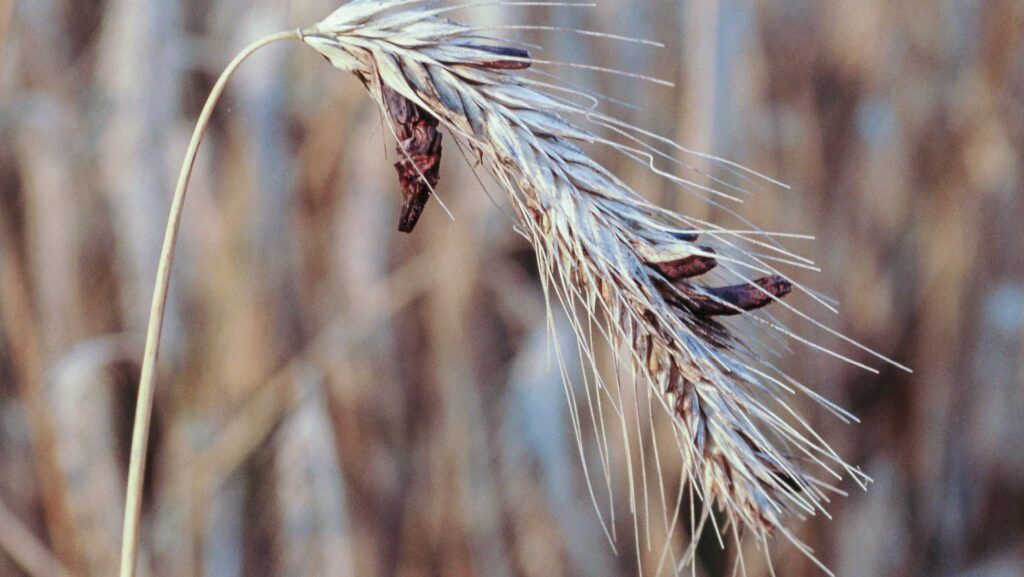Advice for growers dealing with ergot this harvest
 © Blackthorne Arable
© Blackthorne Arable The fungal pathogen ergot is reported to be widespread across UK cereals this harvest, with some growers identifying the disease for the first time in decades.
The greater incidence is thought to be due to cool and wet conditions during flowering, which facilitated spore production and a longer flowering period.
Early flowering grassweeds in field margins are also thought to have contributed. Perhaps ergot is an unintended consequence of environmental scheme measures?
See also: Flea beetle and herbicide benefits of OSR and companion crops
Extra cleaning costs
Given the zero-ergot tolerance in the human consumption trade and the 0.001% ergot weight allowance in feed grain, growers are advised to thoroughly check grain for the distinctive purple-black sclerotia.
According to the AHDB, ergot removal and cleaning is estimated to cost between £10-18/t. Exceeding mycotoxin limits will otherwise incur considerable costs and lead to grain rejections.
Grain machinery specialist McArthur BDC received reports of ergot infected winter barley as early as the end of July.
“Ergot in winter barley is relatively rare, so this was an early indicator of the widespread issue. We’ve had an upward trend of farmers getting in touch on how best to clean crops,” says managing director John McArthur.
The firm’s grain cleaning and sorting specialist, Tom Wood, firstly advises growers to identify what type of ergot issue is present, as there are two main types:
- Grassweed ergots – very small, thin, semi-circular sclerotia structures. Due to being smaller than cereals grains, grass ergots may be removed with a standard sieve cleaner which sorts according to size and density
- Cereal ergots – larger sclerotia structures similar in size to cereal grains which require optical colour sorters to separate the black purple fungus from the golden grain
“Cereal ergots can be slightly lighter than grain, so can be sorted extremely carefully by density. But this is not that effective so colour sorters are advised,” notes Tom.
Growers then need to decide if they are bringing a mobile colour sorting unit on-farm or allowing grain buyers to clean off site.
AHDB analyst Matt Darragh notes: “If you are not a member of a grain store, it could cost approximately £18/t to clean ergot from wheat, while those who are members are usually subject to a discounted rate.”
Mobile colour sorters can also prove a flexible option. “Priced about £13/t, they process around 15t/hour in comparison to commercial cleaning stores at 40t/hour,” he says.
The cost of time may need to be factored into the decision when considering how to clean grain. Demand is certainly rising for mobile colour sorting units, which may limit availability.
It is important to factor in weight loss that can occur during the cleaning process which is approximately 2% of the initial volume.
An increasing number of farmers now have colour sorters installed on farms as a result of grant funding. Ensuring these machines are operating optimally will help minimise losses and enhance ergot removal.
Tom recommends a pre-clean to remove dust or other contaminants such as weed seeds from the grain before colour sorting.
“You want to remove ergot, not saleable product. Even if you reduce losses by 0.5%, over 2,000t it is definitely worth it,” he says.
Strategies to avoid ergot risks
- Inspect crops and grass margins for ergot symptoms prior to harvest
- Avoid growing open flowering varieties and those with a long flowering period
- Pay close attention to fields with higher grassweed pressure and cereals associated with greater ergot risks such as rye and triticale
- Sow later-flowering grass species in grass margins
- Harvest higher-risk field headlands and tramlines separately
- Check loads carefully before tipping onto a heap
- Consider ploughing to bury ergots to at least 5cm depth
- Consider planting a non-cereal crop
- Avoid sowing contaminated seed. Clean farm-saved seed thoroughly
- Some seed treatments may have a small effect by preventing ergot germination (there are no fungicide sprays approved for ergot)
Source: AHDB
